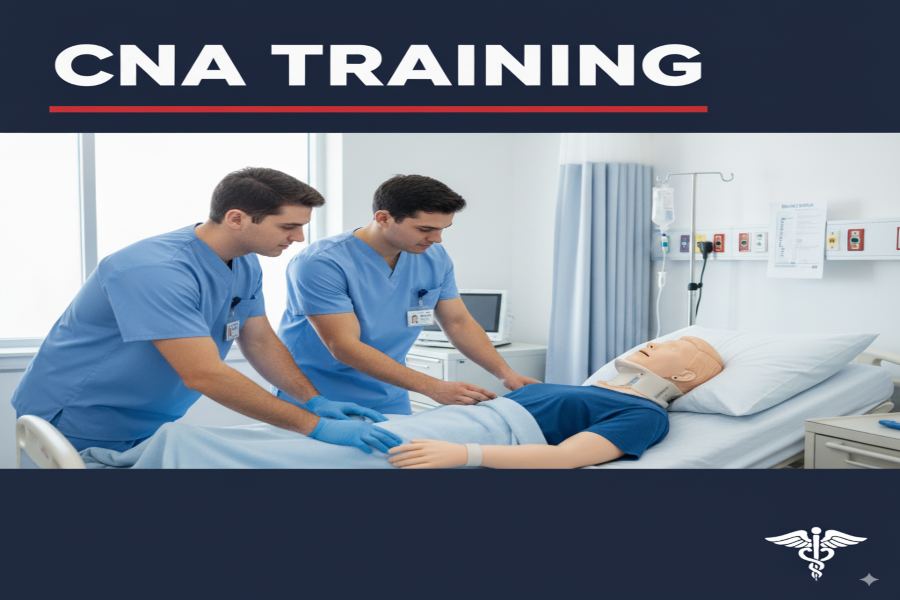Becoming a Certified Nursing Assistant (CNA) offers a fulfilling entry into the healthcare field, providing essential support to patients and contributing to the well-being of communities.
This comprehensive guide outlines the steps, requirements, and resources to help you embark on this rewarding career path.
What Is a Certified Nursing Assistant?
A Certified Nursing Assistant (CNA) plays a crucial role in healthcare settings by assisting patients with daily activities and ensuring their comfort and safety. CNAs work under the supervision of registered nurses (RNs) or licensed practical nurses (LPNs) in various environments, including hospitals, nursing homes, assisted living facilities, and home healthcare.
Key Responsibilities
- Personal Care: Assisting patients with bathing, dressing, grooming, and toileting.
- Mobility Support: Helping patients move, including transferring from beds to wheelchairs.
- Vital Signs Monitoring: Measuring temperature, blood pressure, pulse, and respiration rates.
- Patient Observation: Reporting changes in patients’ conditions to nursing staff.
- Emotional Support: Providing companionship and comfort to patients.
Steps to Become a CNA

- Meet Basic Eligibility Requirements
Before enrolling in a CNA training program, ensure you meet the following criteria:
- Age: Typically, you must be at least 16 years old. Some states may require you to be 18.
- Education: A high school diploma or equivalent (GED) is generally required.
- Background Check: A clean criminal background check is essential, as CNAs work closely with vulnerable populations.
- Health Status: Good physical and mental health is necessary to perform the duties required.
- Complete a State-Approved CNA Training Program
Enroll in a program accredited by your state’s regulatory body. Training programs vary but generally include:
- Classroom Instruction: Covering topics such as anatomy, infection control, patient rights, and communication skills.
- Clinical Practice: Hands-on experience in healthcare settings under supervision.
- Duration: Programs typically last between 4 to 12 weeks, depending on state requirements and program structure.
- Pass the CNA Certification Exam
After completing the training program, you must pass a state certification exam, which usually consists of:
- Written Test: Assessing knowledge of nursing concepts and procedures.
- Skills Test: Demonstrating proficiency in clinical tasks, such as taking vital signs and assisting with patient mobility.
- Apply for State Certification
Upon passing the exam, submit an application to your state’s nurse aide registry. This process may involve:
- Application Form: Completing the necessary paperwork.
- Documentation: Providing proof of training and exam results.
- Fees: Paying any applicable certification fees.
Once certified, you are eligible to work as a CNA in your state.
CNA Training Curriculum
A comprehensive CNA training program covers various topics to prepare you for the certification exam and your role as a nursing assistant. Key areas of study include:
- Basic Nursing Skills: Techniques for patient care, including feeding, bathing, and dressing.
- Infection Control: Methods to prevent the spread of infections.
- Patient Rights and Ethics: Understanding patients’ rights and ethical considerations in healthcare.
- Emergency Procedures: Responding to medical emergencies and understanding safety protocols.
- Communication Skills: Effective communication with patients, families, and healthcare teams.
Clinical Skills for CNA Certification
The clinical skills portion of the certification exam evaluates your ability to perform essential nursing tasks. Common skills tested include:
- Hand Hygiene: Proper handwashing techniques.
- Measuring Vital Signs: Accurately taking temperature, blood pressure, pulse, and respiration.
- Assisting with Ambulation: Helping patients move safely.
- Feeding Assistance: Aiding patients with eating, ensuring nutritional needs are met.
- Personal Hygiene Care: Assisting with bathing, grooming, and toileting.
Career Outlook for CNAs
The demand for CNAs is projected to grow due to an aging population and increased need for healthcare services. According to the U.S. Bureau of Labor Statistics, employment of nursing assistants is expected to increase by 8% from 2020 to 2030, faster than the average for all occupations.
Potential Work Environments
- Hospitals: Providing acute care to patients.
- Nursing Homes: Assisting elderly residents with daily activities.
- Assisted Living Facilities: Supporting individuals who need help with daily tasks but wish to maintain independence.
- Home Healthcare: Delivering care to patients in their homes.
Advancement Opportunities
CNAs can pursue further education and training to advance their careers, such as:
- Licensed Practical Nurse (LPN): Requires additional education and training.
- Registered Nurse (RN): Involves completing a nursing program and obtaining a nursing license.
- Specialized Certifications: Opportunities to specialize in areas like geriatrics or hospice care.
Tips for Success in CNA Training
- Stay Organized: Keep track of assignments, clinical hours, and exam dates.
- Practice Skills Regularly: Repetition helps build confidence and proficiency.
- Seek Support: Don’t hesitate to ask instructors or peers for assistance when needed.
- Maintain Professionalism: Demonstrate a strong work ethic, compassion, and respect for patients.
Advanced Skills and Knowledge for CNAs
While entry-level CNAs focus on basic patient care, advanced skills allow you to provide more comprehensive support and increase your value to employers. Developing these skills helps you excel in various healthcare environments and opens the door for career growth.
Infection Control and Prevention
Infection control goes beyond basic hygiene. CNAs must understand how to prevent the transmission of infections in healthcare settings. This includes:
- Understanding Pathogens: Knowing the difference between bacteria, viruses, and fungi, and recognizing common infections in healthcare facilities.
- Proper Use of PPE: Correctly using gloves, masks, gowns, and eye protection to minimize exposure to infectious agents.
- Cleaning and Disinfecting Protocols: Properly sanitizing equipment, rooms, and surfaces according to healthcare facility standards.
- Monitoring Symptoms: Identifying early signs of infection in patients and reporting to supervisors promptly.
Emergency Preparedness
Emergencies can occur at any time. CNAs are often the first responders in patient care situations. Training should include:
- Cardiopulmonary Resuscitation (CPR): Performing effective chest compressions and rescue breathing for patients experiencing cardiac arrest.
- Basic Life Support (BLS): Responding to airway blockages, respiratory distress, or unconscious patients.
- Fall and Injury Response: Assisting patients safely after falls and providing initial care before medical professionals arrive.
- Disaster Procedures: Understanding evacuation protocols and assisting in large-scale emergencies, such as natural disasters or mass casualty events.
Patient Communication and Advocacy
Effective communication is critical for CNAs. You serve as a bridge between patients and nursing staff, requiring clarity, empathy, and attentiveness.
- Active Listening: Fully understanding patient concerns without interruptions.
- Non-Verbal Cues: Recognizing body language, facial expressions, and changes in behavior.
- Cultural Competence: Providing care that respects patients’ diverse cultural, religious, and personal beliefs.
- Patient Advocacy: Identifying needs, reporting changes in condition, and ensuring patients’ rights are upheld.
Specialized CNA Roles
Beyond general patient care, CNAs can pursue specialized certifications to address the needs of specific populations:
- Geriatric Care Assistant: Focused on elderly patients, addressing mobility, chronic illness management, and cognitive impairments like dementia.
- Hospice and Palliative Care CNA: Supporting patients with terminal illnesses, focusing on comfort, symptom management, and emotional support for patients and families.
- IV Therapy and Medication Administration: Some states allow CNAs with additional training to assist with medication delivery under supervision.
- Mental Health CNA: Working in psychiatric facilities to assist patients with mental health challenges while ensuring safety and promoting therapeutic communication.
Continuing Education for CNAs
Healthcare is constantly evolving. CNAs can enhance their expertise and maintain certification through ongoing education:
- In-Service Training: Provided by employers to introduce new procedures, technologies, and safety protocols.
- Workshops and Seminars: External programs offer training on advanced skills, patient care innovations, and regulatory updates.
- Online Learning Platforms: Many websites offer modules on topics like infection control, patient rights, or specialized care procedures.
- Professional Associations: Joining organizations such as the National Network of Career Nursing Assistants (NNCNA) offers access to certifications, educational resources, and networking opportunities.
Technology in CNA Training
Modern CNA programs integrate technology to enhance learning outcomes and prepare students for real-world environments.
- Simulation Labs: Using mannequins and interactive models to practice procedures before entering patient care settings.
- Virtual Reality (VR) Training: Providing immersive scenarios for emergency response, patient interaction, and clinical decision-making.
- Digital Logbooks: Tracking clinical hours, competencies, and patient interactions in real-time.
- Online Practice Exams: Simulating certification exams with real-time feedback to improve test readiness.
Understanding State-Specific Regulations
CNA training and certification requirements vary by state. Knowing these differences ensures compliance and eligibility:
- Training Hours: States mandate different minimum hours for classroom instruction and clinical practice. Some require as few as 75 hours, while others exceed 120.
- Certification Exams: Written and clinical exam formats differ. Certain states allow oral exams for candidates with language barriers.
- Continuing Education: Many states require CNAs to complete continuing education credits to renew certification, often annually or biennially.
- Registry Requirements: Maintaining a current listing on the state nurse aide registry is essential to remain legally employable.
Preparing for the Clinical Environment
Clinical rotations are a core component of CNA training, providing hands-on experience in healthcare facilities. Preparing effectively ensures a smooth transition:

- Time Management: Balancing rotations with classroom instruction and study time is critical.
- Professional Etiquette: Arriving on time, dressing appropriately, and following facility protocols demonstrate reliability and respect.
- Patient Interaction: Practicing empathy, active listening, and patience helps build trust and improves patient outcomes.
- Documentation: Accurate record-keeping of patient conditions, care provided, and observations is vital for communication with nurses and doctors.
Exam Preparation Strategies
Passing the CNA certification exam requires targeted preparation:
- Understand the Exam Format: Review the structure of both the written and skills tests.
- Use Practice Tests: Completing multiple practice exams increases familiarity with question types and timing.
- Master Clinical Skills: Repeatedly practice tasks like measuring vital signs, transferring patients, and performing hygiene procedures.
- Study Groups: Collaborating with classmates can help identify weak areas and reinforce learning.
- Review Key Concepts: Focus on infection control, patient rights, safety procedures, and emergency responses.
Career Advancement and Opportunities
While CNAs often start in entry-level positions, numerous pathways exist for career growth:
- LPN or RN Transition: Many CNAs pursue further nursing education to advance into Licensed Practical Nurse or Registered Nurse roles.
- Leadership Roles: Experienced CNAs can become lead CNAs or supervisors within nursing teams.
- Specialty Certifications: Adding credentials in gerontology, hospice care, or mental health increases employability and salary potential.
- Healthcare Education: CNAs can become instructors or mentors in training programs, sharing expertise with future professionals.
Salary and Job Outlook
The Bureau of Labor Statistics reports that as of 2024, the median annual wage for nursing assistants is approximately $38,000, with potential for higher earnings in hospitals or specialized care facilities. Job growth remains strong due to:
- Aging Population: Increased demand for eldercare in nursing homes and assisted living.
- Healthcare Expansion: More facilities and home health services require trained CNAs.
- Chronic Illness Management: Growing needs for patient monitoring and assistance in long-term care settings.
Conclusion
Becoming a Certified Nursing Assistant is a fulfilling career choice that offers the opportunity to make a positive impact on patients’ lives. By completing a state-approved training program, passing the certification exam, and obtaining state certification, you can embark on a rewarding journey in the healthcare field.

